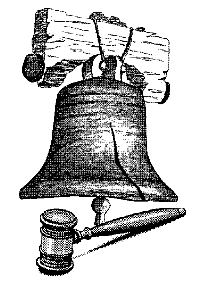A recent decision by the D.C. Circuit could preview the outcome of a similar case in the Supreme Court concerning campaign finance laws. In short, the federal court determined that some provisions of the McCain-Feingold Act that limited the amounts that non-profit groups could spend on election-related activities also impeded citizens' rights to free expression. The Supreme Court is expected to rule soon on a similar challenge concerning corporations.
There are several ways of reading this decision depending on one's own political and ideological inclinations. Supporters of campaign finance reform contend that relaxing the restrictions on these groups will encourage corruption in the political process. Supporters of the decision no doubt welcome the larger role non-profit groups are now likely to play in future elections. The decision by the D.C. Circuit does not come close to silencing the quarrel between these two camps -- especially since it can still be appealed to the Supreme Court and is thus far from being recognized as settled law. On the contrary, the decision to allow non-profit groups wider latitude in election spending only draws more attention to the debate over how much of a role such organizations ought to play in the political process.
The pending case in the Supreme Court is similar, but it focuses on the political activities and contributions of corporations rather than non-profits. While it is clear that parallels to the instant case exist, there is also an argument to be made that the flexibility granted to non-profits and corporations should not be equal. Non-profit organizations (e,g. EMILY's List, the group that brought the challenge in the above case) rely on a particular constituency composed of individuals with like-minded views. It is easier to trace the path of their contributions to individual citizens and to impute the purpose of political expression to these donors. Moreover, in a world where large scale, effective communication campaigns have become extremely technical and increasingly expensive, it is not difficult to see how aggregating resources and channeling a political message through a single entity significantly furthers the purpose of expressing a particular view.
It is arguably more difficult to discern this important connection when it comes to corporations, which derive their spending power from profits and effective business models rather than direct contributions from individuals who share similar views. Though common beliefs and values may indeed be prevalent in a corporate environment and contribute to the cultivation of a particular ideological climate, the spending power of a private business is not directly tied to the popularity of beliefs in the same way as a non-profit organization. For example, dissention by mid-level workers from a popular conception propogated by corporate executives is unlikely to affect those political causes and campaigns to which the corporation actually contributes. Yet, if the Supreme Court rules as many commentators have predicted, restrictions on spending by these corporations will soon be greatly relaxed as well.
While the Court has ruled in the past that corporations are (for all intents and purposes) to be endowed with many of the rights and privileges of actual citizens, it seems problematic to offer them more flexibility in the area of politics. One could argue, for instance, that the executives, stock holders, employees, etc. who make up the corporation can simply exercise their rights to free speech individually or through non-profit organizations with which they agree. The fact that the vast resources of corporations are not subject to the same popular influence that affects non-profit organizations is also troubling because it seems to shift the balance of power in political discussion. Insulated from public opinion by practice and profit, those at the helms of large corporations would likely acquire greater influence in the political process -- a notion that is hard to reconcile with the idea of democratic self-governance by the people.
No one doubts that the upcoming decision will dramatically affect the landscape of electoral politics -- regardless of the outcome. Most scholars and interested observers, however, have predicted that the Supreme Court will probably issue a ruling in favor of corporate freedom. Hopefully such a decision would not come at the expense of the People.
Tuesday, September 22, 2009
Subscribe to:
Post Comments (Atom)


No comments:
Post a Comment